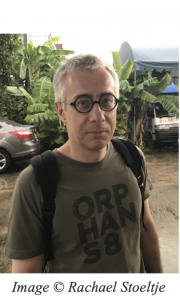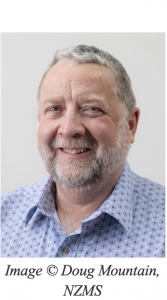One of the key missions of the Southeast Asia-Pacific Audiovisual Archive Association (SEAPAVAA) is to advocate the advancement of the professional development and recognition of audiovisual archivists who safeguard the rich audiovisual heritage of the region.
Inaugurated by SEAPAVAA in 1997 as the Lifetime Achievement Award and re-established in 2010 as the Fellowship Award, the award encapsulates and pursues this mission of honouring exceptional service and achievements in the field of audiovisual archiving in the region.
The SEAPAVAA Fellowship Award today is a special recognition given to an individual’s lifetime achievement in the field of audiovisual archiving or whose exceptional service to SEAPAVAA has contributed to the development of audiovisual archiving in the Southeast Asia-Pacific region.
Recipients of the SEAPAVAA Lifetime Achievement Award and Fellowship, listed alphabetically by family name:
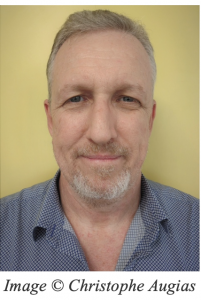 Born in New-Caledonia, Christophe Augias studied English in Aix-en-Provence before becoming a librarian in 1997. He graduated in 2000 from the French national school of library sciences (ENSSIB) to become a chief librarian. He is nowadays the Director of Culture for the Government of New-Caledonia. He is involved in issues overseeing culture, women’s status and AV issues, and is also in charge of the museum and the archives.
Born in New-Caledonia, Christophe Augias studied English in Aix-en-Provence before becoming a librarian in 1997. He graduated in 2000 from the French national school of library sciences (ENSSIB) to become a chief librarian. He is nowadays the Director of Culture for the Government of New-Caledonia. He is involved in issues overseeing culture, women’s status and AV issues, and is also in charge of the museum and the archives.
Christophe was formerly the director of New-Caledonia’s territorial library: the Bibliothèque Bernheim and under his direction, Bernheim co-hosted the first SEAPAVAA Pacific conference in 2011 and hosted the 23rd SEAPAVAA (and 3rd Pacific) conference in 2019. Along the way, he also initiated and organized ten occasions of New Caledonia’s literary festival (SILO).
Christophe joined SEAPAVAA in 2010 where he served two terms in the EC from 2014 to 2020 including one as vice president. Christophe was honoured as a Fellow in 2023.
Belina Capul (1952–2023) was the former staff Director and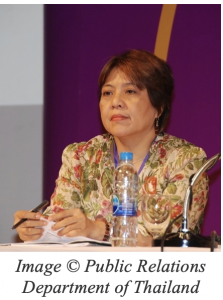 archivist of the Philippine Information Agency (PIA), the country’s chief communication arm. Her advocacy on safeguarding the audio-visual heritage had a national, regional, and global reach. She originated the concept of a regional association, which matured as SEAPAVAA in 1996. She proposed the inscription of key historical audio-visual materials, such as the radio broadcast recording of the 1986 Philippine People Power Revolution, on the UNESCO Memory of the World International Register.
archivist of the Philippine Information Agency (PIA), the country’s chief communication arm. Her advocacy on safeguarding the audio-visual heritage had a national, regional, and global reach. She originated the concept of a regional association, which matured as SEAPAVAA in 1996. She proposed the inscription of key historical audio-visual materials, such as the radio broadcast recording of the 1986 Philippine People Power Revolution, on the UNESCO Memory of the World International Register.
Bel served in the SEAPAVAA Executive Council as a Secretary-General from 1996 – 2002 and President from 2002 – 2008. Bel received the Lifetime Achievement Award in 2014.
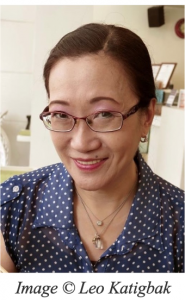 Mary Del Pilar is a trailblazer for the development of audiovisual archiving in the Philippines. She was a founding member of the Society of Filipino Archivists for Film (SOFIA) in 1993 and was elected as its Board President in 2013. During her time with SOFIA, she worked with passionate Filipino archivists to advocate the importance of restoration, preservation, and proper storage of films through events like workshops and film screenings. Mary was also the former manager of the film archive department of ABS-CBN Broadcasting Corporation.
Mary Del Pilar is a trailblazer for the development of audiovisual archiving in the Philippines. She was a founding member of the Society of Filipino Archivists for Film (SOFIA) in 1993 and was elected as its Board President in 2013. During her time with SOFIA, she worked with passionate Filipino archivists to advocate the importance of restoration, preservation, and proper storage of films through events like workshops and film screenings. Mary was also the former manager of the film archive department of ABS-CBN Broadcasting Corporation.
Mary was honoured as a Fellow in 2017.
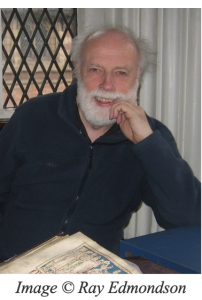 Dr. Ray Edmondson OAM is a pioneer and international influencer in the development of the audio-visual archiving field in the region. He is recognised as the “moving spirit” behind the creation of the National Film and Sound Archive of Australia (NFSA); he was its Deputy Director until 2001, and endowed as its first honorary Curator Emeritus. Of his writings, the most widely translated are the three editions of Audiovisual Archiving: Philosophy and Principles. Ray has been involved in UNESCO’s Memory of the World Program since 1996, authoring its General Guidelines in 2002, and has served in various roles on its Australian and international committees, chairing the Asia Pacific Regional Committee (MOWCAP) from 2005 to 2014.
Dr. Ray Edmondson OAM is a pioneer and international influencer in the development of the audio-visual archiving field in the region. He is recognised as the “moving spirit” behind the creation of the National Film and Sound Archive of Australia (NFSA); he was its Deputy Director until 2001, and endowed as its first honorary Curator Emeritus. Of his writings, the most widely translated are the three editions of Audiovisual Archiving: Philosophy and Principles. Ray has been involved in UNESCO’s Memory of the World Program since 1996, authoring its General Guidelines in 2002, and has served in various roles on its Australian and international committees, chairing the Asia Pacific Regional Committee (MOWCAP) from 2005 to 2014.
He was the founding SEAPAVAA President from 1996 – 2002. Ray received the Lifetime Achievement Award in 2010 and, in the same year, was also honoured as a Fellow.
ray@archival.au
Having graduated in both mathematics and computer science, Reto Kromer became involved in audio-visual conservation and restoration thirty-seven years ago. He has been running his own preservation company, AV Preservation by reto.ch, and lecturing at the Bern University of Applied Sciences, the Academy of Fine Arts Vienna and the Elías Querejeta Zine Eskola in Donostia (San Sebastián). Previously he was head of preservation at the Cinémathèque suisse (the Swiss National Film Archive) as well as a lecturer at the University of Lausanne. His courses cover the conservation and restoration not only of audio-visual content but also audio-visual carriers, usually with a focus on technical issues and motion picture film.
His current research is mainly focused in the digital domain and includes colour spaces, look-up tables and codec programming and emulation, as well as methods to also restore actual files and the so-called raw data they hold. He served as an AMIA board member for four years. His work has seen him honoured with an inaugural Joint Technical Symposium Award.
Reto was honoured as a Fellow in 2023.
https://reto.ch
Jamie Lean is an experienced senior leader and manager in the field of archives and records curation, specialising in audiovisual collections. He has over two and a half decades of practical and managerial experience in audiovisual archiving covering the game-changing transition to digital archiving in which he has a particular interest. Jamie was a former Group Manager (Collections) and then Principal Archivist at Ngā Taonga Sound and Vision (formerly the New Zealand Film Archive), where he managed the transition to digital workflows and created new physical and digital archival storage. He was one of the founders of the New Zealand National Committee for UNESCO’s Memory of the World Programme and served as its Deputy Chair for 8 years. Jamie holds a Masters in Information Management and is currently the Operations Manager for New Zealand Micrographics.
He served as the SEAPAVAA Secretary-General 2005 – 2008. Jamie was honoured as a Fellow in 2019.
jamielean696@gmail.com
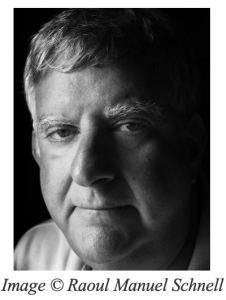 Jim Lindner is an internationally respected authority on the preservation and migration of electronic media. Jim pioneered many of the techniques now commonly used for videotape restoration and migration to file workflows. He has lectured widely on and written about media preservation for the past twenty-five years and has served on a variety of international media-asociated boards and organizations for many years.
Jim Lindner is an internationally respected authority on the preservation and migration of electronic media. Jim pioneered many of the techniques now commonly used for videotape restoration and migration to file workflows. He has lectured widely on and written about media preservation for the past twenty-five years and has served on a variety of international media-asociated boards and organizations for many years.
While Jim’s first awards were as a filmmaker, he went on to receive many awards, first for his pioneering work in computer animation and later for his work in media preservation.
Jim served as a SEAPAVAA Councillor from 1999 – 2008 and was honoured as a Fellow in 2010.
jim@media-matters.net
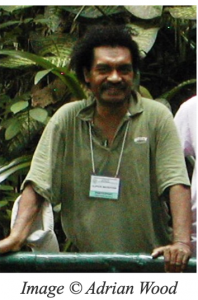 Alipate Mateitoga (1957–2009) was a driving force behind television programmes in Fiji such as Dateline Fiji, Voga Ni Davui, and Sitara. He helped train and inspire a generation of camera operators, producers, and editors in Fijian television. His involvement in audio-visual archiving began in 1998 when he attended the UNESCO–SEAPAVAA Advanced Training Workshop on the Treatment of Vinegar Syndrome and Mould Affected Films in Hanoi, Vietnam. Alipate regularly joined SEAPAVAA Conferences and contributed to the Association as a member of the 2004 Technical Committee.
Alipate Mateitoga (1957–2009) was a driving force behind television programmes in Fiji such as Dateline Fiji, Voga Ni Davui, and Sitara. He helped train and inspire a generation of camera operators, producers, and editors in Fijian television. His involvement in audio-visual archiving began in 1998 when he attended the UNESCO–SEAPAVAA Advanced Training Workshop on the Treatment of Vinegar Syndrome and Mould Affected Films in Hanoi, Vietnam. Alipate regularly joined SEAPAVAA Conferences and contributed to the Association as a member of the 2004 Technical Committee.
He was the first representative of a Pacific Island nation in the SEAPAVAA Executive Council when he was elected as a Councillor in 2008. Alipate was posthumously honoured as a Fellow in 2020.
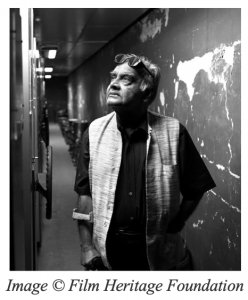 Paramesh Krishnan ‘P.K.’ Nair (1933–2016) was an Indian film archivist and film scholar. He was one of the founding employees and later director of the National Film Archive of India (NFAI) in 1964. He is regarded as the Henri Langlois of India because of his lifelong dedication towards the preservation of films in India. He worked at the NFAI for over three decades, collecting films from India and from all over the world. When he retired in April 1991, he had collected over 12,000 films, of which 8,000 were Indian.
Paramesh Krishnan ‘P.K.’ Nair (1933–2016) was an Indian film archivist and film scholar. He was one of the founding employees and later director of the National Film Archive of India (NFAI) in 1964. He is regarded as the Henri Langlois of India because of his lifelong dedication towards the preservation of films in India. He worked at the NFAI for over three decades, collecting films from India and from all over the world. When he retired in April 1991, he had collected over 12,000 films, of which 8,000 were Indian.
P.K. Nair influenced generations of filmmakers, particularly those of the Indian New Wave, by showcasing the best of world cinema and regional cinema from the archive collection. Shivendra Singh Dungarpur’s award-winning film “Celluloid Man” paid tribute to a singular archivist who was the custodian of India’s film heritage in his lifetime. P.K. Nair donated his archive of books, diaries, and documents for preservation to Film Heritage Foundation that has published a collection of his writings in the book “Yesterday’s Films for Tomorrow”.
P.K. was a founding member of SEAPAVAA and served as a SEAPAVAA Council Member from 1996 – 1999. He was posthumously honoured as a Fellow in 2020.
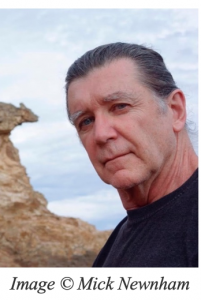 Mick Newnham is a heritage preservation consultant, and previously worked at the National Film and Sound Archive of Australia (NFSA) as the manager of Conservation Services. Since 1995, Mick has been providing consultancies and workshops in audiovisual collection management and preservation on behalf of NFSA, UNESCO, ASEAN, ICCROM, and SEAPAVAA, within and beyond the Asia-Pacific region. Mick’s original research regarding audiovisual media conservation and preservation has been widely published and incorporated into preservation practices and commercial products across the world.
Mick Newnham is a heritage preservation consultant, and previously worked at the National Film and Sound Archive of Australia (NFSA) as the manager of Conservation Services. Since 1995, Mick has been providing consultancies and workshops in audiovisual collection management and preservation on behalf of NFSA, UNESCO, ASEAN, ICCROM, and SEAPAVAA, within and beyond the Asia-Pacific region. Mick’s original research regarding audiovisual media conservation and preservation has been widely published and incorporated into preservation practices and commercial products across the world.
He served as the SEAPAVAA President from 2014 – 2017. Mick was honoured as a Fellow in 2018.
mick1asia@hotmail.com
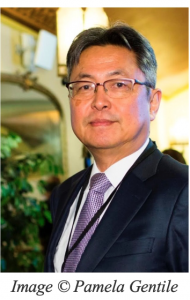 Hisashi Okajima continues to be an active guardian of film heritage from Japan and Asia. His career began at the National Film Center (NFC), a division of the National Museum of Modern Art (MOMAT), Tokyo, in 1979 where he was responsible for numerous and varied film-related projects. Hisashi was appointed as Chief Curator, the head of NFC, in April, 2005. When, in 2018, NFC became the autonomous and independent institution the National Film Archive of Japan (NFAJ), Hisashi was appointed as its inaugural Director. Active over many years in various roles within the International Federation of Film Archives (FIAF), he was elected as its 12th President from 2009 – 2011, the first FIAF President from an Asian country.
Hisashi Okajima continues to be an active guardian of film heritage from Japan and Asia. His career began at the National Film Center (NFC), a division of the National Museum of Modern Art (MOMAT), Tokyo, in 1979 where he was responsible for numerous and varied film-related projects. Hisashi was appointed as Chief Curator, the head of NFC, in April, 2005. When, in 2018, NFC became the autonomous and independent institution the National Film Archive of Japan (NFAJ), Hisashi was appointed as its inaugural Director. Active over many years in various roles within the International Federation of Film Archives (FIAF), he was elected as its 12th President from 2009 – 2011, the first FIAF President from an Asian country.
Hisashi’s publications include the official record of the 63rd FIAF Congress symposium as well as the official record of the symposia organised by NFC/MOMAT-Four Tasks of Film Archives (Japanese and English, 1992) and Redefining the Tasks of Film Archives (Japanese only, 2003). He also drafted FIAF’s 70th anniversary manifesto which coined the campaign slogan Don’t Throw Film Away. As a frequent speaker on film history and film archiving at conferences in Japan and around the world, he was, until recently, an active contributor to Japan Society of Image Arts and Sciences, serving as its Vice-President from 2012 – 2014.
Hisashi was honoured as a SEAPAVAA Fellow in 2010 and was further honoured, in 2016, when he received the Jean Mitry Award of Le Giornate del cinema muto festival, in Pordenone, Italy.
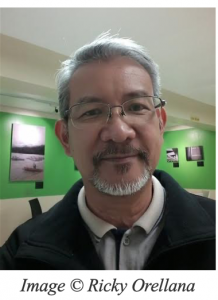 Ricky Orellana is a multi-talented filmmaker, animator, and cartoonist. He is the director of the Mowelfund Film Institute (MFI) and the head of MFI’s audio-visual archive. His dedication and work with MFI have contributed significantly to safeguarding the Filipino films gathered independently from artists, directors, and collectors and puts further into practice through teaching part-time at the College of Saint Benilde – School of Design & Arts and at the iACADEMY. He is a member of the Society of Filipino Archivists for Film (SOFIA) and is currently a board member of the Animation Council of the Philippines (ACPI). Ricky’s illustrations and animations on topical aspects of audio-visual archiving have been a feature of SEAPAVAA publications since the beginning of the Association.
Ricky Orellana is a multi-talented filmmaker, animator, and cartoonist. He is the director of the Mowelfund Film Institute (MFI) and the head of MFI’s audio-visual archive. His dedication and work with MFI have contributed significantly to safeguarding the Filipino films gathered independently from artists, directors, and collectors and puts further into practice through teaching part-time at the College of Saint Benilde – School of Design & Arts and at the iACADEMY. He is a member of the Society of Filipino Archivists for Film (SOFIA) and is currently a board member of the Animation Council of the Philippines (ACPI). Ricky’s illustrations and animations on topical aspects of audio-visual archiving have been a feature of SEAPAVAA publications since the beginning of the Association.
He served as the SEAPAVAA Secretary-General from 2017 – 2019. Ricky was honoured as a Fellow in 2017.
ricky.orellana@mowelfund.com
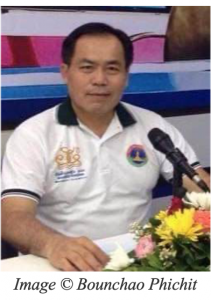 Bounchao Phichit is a producer, scriptwriter, director, and dedicated film archivist. He pioneered film archiving in Lao PDR through the creation and development of the National Film Archive and Video Center, where he was appointed as Deputy Director in 1994 and Director in 2000. His work has greatly contributed towards establishing film as national heritage in Lao PDR for the present and future generations. In 2008, he became the Director-General of the Lao Cinema Department and since 2014 until 2021 he was the Director-General of Lao National Television.
Bounchao Phichit is a producer, scriptwriter, director, and dedicated film archivist. He pioneered film archiving in Lao PDR through the creation and development of the National Film Archive and Video Center, where he was appointed as Deputy Director in 1994 and Director in 2000. His work has greatly contributed towards establishing film as national heritage in Lao PDR for the present and future generations. In 2008, he became the Director-General of the Lao Cinema Department and since 2014 until 2021 he was the Director-General of Lao National Television.
He served as a founding member of SEAPAVAA and has served in the Executive Council from 2002 – 2008. Bounchao was honoured as a Fellow in 2018.
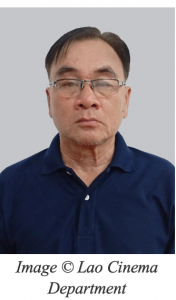 Following graduation from high school in 1979 Vongchith Phommachack joined the Lao Cinema Department as a sound recordist. In 1987, after majoring in sound recording and sound engineering, he graduated from the Film and Television Institute of India. He then returned to his career as a sound recordist at the Lao Cinema Department until it became the renamed Lao National Film Archive and Video Center. Vongchith’s work there as a film archivist began in 1991.
Following graduation from high school in 1979 Vongchith Phommachack joined the Lao Cinema Department as a sound recordist. In 1987, after majoring in sound recording and sound engineering, he graduated from the Film and Television Institute of India. He then returned to his career as a sound recordist at the Lao Cinema Department until it became the renamed Lao National Film Archive and Video Center. Vongchith’s work there as a film archivist began in 1991.
It was five years later, in May, 1996 Vongchith participated in the 2nd workshop hosted by NFSA in Canberra. This was jointly funded by the ASEAN Committee on Culture and Information (COCI), the Australian Department of Foreign Affairs and Kodak. The workshop focused on film and video collection development, cataloguing and collection control. It took place only 2 months after the inaugural SEAPAVAA meeting in Manila.
Vongchith attended his first SEAPAVAA conference, hosted by Lao PDR, in 2002. By 2008 he had risen to the position of Deputy Director General, in charge of supervising the film archive at Lao Cinema Department part of the Ministry of Information and Culture.
For the SEAPAVAA conference in 2014, the second to be hosted by Lao PDR, he played a key role in its organization and had an opportunity once again to foster international relations.
During his career at Lao National Film Archive and Video Center and Lao Cinema Department, spanning more than three decades, he also produced four documentary films and one feature film. Most importantly he shared his skills, knowledge, and experiences with new generations of archivists at Lao Cinema Department.
Vongchith was inaugurated as a Fellow in 2023.
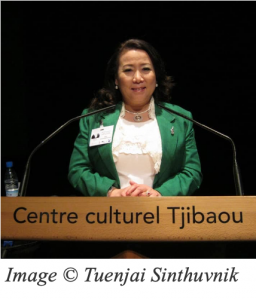 Tuenjai ‘Lek’ Sinthuvnik is a devoted audiovisual archivist in Thailand. She was a Deputy Director-General of the Government Public Relations Department of Thailand (PRD). During her term in PRD, she had pushed PRD to play an important role in hosting “ The Steering Committee “ to draft SEAPAVAA’s First Constitution in Bangkok, Thailand in August 1995. Thereafter, SEAPAVAA was legally constituted and registered in Manila, Philippines in February 1996. Lek Tuenjai helped the organization, PRD, towards its goal in preserving audiovisual archives and document records of national and historical significance to the country.
Tuenjai ‘Lek’ Sinthuvnik is a devoted audiovisual archivist in Thailand. She was a Deputy Director-General of the Government Public Relations Department of Thailand (PRD). During her term in PRD, she had pushed PRD to play an important role in hosting “ The Steering Committee “ to draft SEAPAVAA’s First Constitution in Bangkok, Thailand in August 1995. Thereafter, SEAPAVAA was legally constituted and registered in Manila, Philippines in February 1996. Lek Tuenjai helped the organization, PRD, towards its goal in preserving audiovisual archives and document records of national and historical significance to the country.
Lek served in the SEAPAVAA Executive Council as its first Treasurer from 1996 -1999 and Third President consecutively for two terms from 2008 – 2014. Lek was honoured as a Fellow in 2017.
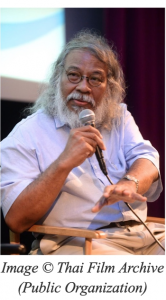 As a child, Dome Sukvong dreamt to be a village projectionist as well as a world championship boxer then later became a full-time film archivist. He was a guest lecturer on film history in many universities and a freelance writer on films for newspapers and magazines. He is a key force in the preservation of Thailand’s film heritage through the creation of the National Film Archives of Thailand (NFAT) in 1984. Despite having a limited budget and only a handful of people, Dome and his staff were able to acquire much of the film and film-related materials that would form the extensive collection of the Thai film archive. In 2009, he reformed the NFAT to an autonomous administrative organisation and NFAT was renamed as Thai Film Archive (Public Organization). Since then, Thai Film Archive has become one of the leading Film Archives in the region.
As a child, Dome Sukvong dreamt to be a village projectionist as well as a world championship boxer then later became a full-time film archivist. He was a guest lecturer on film history in many universities and a freelance writer on films for newspapers and magazines. He is a key force in the preservation of Thailand’s film heritage through the creation of the National Film Archives of Thailand (NFAT) in 1984. Despite having a limited budget and only a handful of people, Dome and his staff were able to acquire much of the film and film-related materials that would form the extensive collection of the Thai film archive. In 2009, he reformed the NFAT to an autonomous administrative organisation and NFAT was renamed as Thai Film Archive (Public Organization). Since then, Thai Film Archive has become one of the leading Film Archives in the region.
Dome was honoured as a Fellow in 2018.
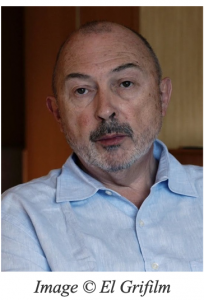 Adrian Wood has been actively promoting audio-visual archiving in the Southeast Asia-Pacific region for over 25 years. In 2011 he pioneered the series of workshops under the banner of Restoration Asia, which showcase the work of archives, technical service providers and film distributors in their efforts to recover, preserve, and restore the audio-visual heritage of Asia. From 1996 until 2016, Adrian worked as an independent consultant with the International Olympic Committee (IOC) in recovering and preserving the Olympic Official Films. His more than four decades of work in documentary production continues to draw upon archive collections both from the region and elsewhere. His earliest awards and honours were in recognition of his work in that area.
Adrian Wood has been actively promoting audio-visual archiving in the Southeast Asia-Pacific region for over 25 years. In 2011 he pioneered the series of workshops under the banner of Restoration Asia, which showcase the work of archives, technical service providers and film distributors in their efforts to recover, preserve, and restore the audio-visual heritage of Asia. From 1996 until 2016, Adrian worked as an independent consultant with the International Olympic Committee (IOC) in recovering and preserving the Olympic Official Films. His more than four decades of work in documentary production continues to draw upon archive collections both from the region and elsewhere. His earliest awards and honours were in recognition of his work in that area.
He served on the SEAPAVAA Executive Council as a Councillor from 2008 – 2014 and then as Treasurer from 2014 – 2017. Adrian was honoured as a Fellow in 2019.
adrian@adrianwood.com
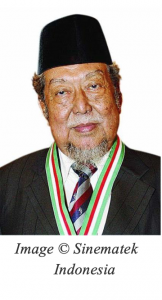 Misbach Yusa Biran (1933–2012) was a pioneer film archivist, founder, and former Director of Sinematek Indonesia. In 1967, he was selected as the Best Director for the film Dibalik Tjahaya Gemerlapan (“Behind the Glittering Lights”), and he received the Best Screenplay award for the movie Menyusuri Jejak Berdarah (“Bloody Tracks Down”). For more than three decades, Misbach stood for the cause of film preservation as he worked tirelessly, with limited resources, to establish Indonesia’s first film archive in 1975. He also chaired the organisation’s Indonesian Film Makers, a foundation that provides free education to Indonesian film makers. Misbach was the first recipient to be honoured with the Lifetime Achievement Award in 1997. In 2010 he was further honoured as a Fellow.
Misbach Yusa Biran (1933–2012) was a pioneer film archivist, founder, and former Director of Sinematek Indonesia. In 1967, he was selected as the Best Director for the film Dibalik Tjahaya Gemerlapan (“Behind the Glittering Lights”), and he received the Best Screenplay award for the movie Menyusuri Jejak Berdarah (“Bloody Tracks Down”). For more than three decades, Misbach stood for the cause of film preservation as he worked tirelessly, with limited resources, to establish Indonesia’s first film archive in 1975. He also chaired the organisation’s Indonesian Film Makers, a foundation that provides free education to Indonesian film makers. Misbach was the first recipient to be honoured with the Lifetime Achievement Award in 1997. In 2010 he was further honoured as a Fellow.
